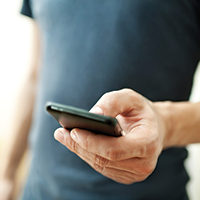
Smartphones have changed the business world for the better. We can find, access, analyze, and share real-time information in seconds flat, and that is only the beginning. Besides automating tasks, smartphones deliver constant connection, virtual meeting space, instant payless payment, and flexible working hours. This last point is something most people champion as a main selling feature, and for good reason—working on a plane or in the line-up at the movies can be the perfect bridge to work-life balance—until it isn’t.
The downside of all this convenience and productivity is the inherent inability to disconnect—partially because it becomes our new normal and partially because of the addictive nature of the apps that make our lives so much more convenient. While many of us have fallen victim to the allure of constant connection, there are plenty of ways to strike a balance, especially while on vacation or during any time set aside to unplug.
First, let’s look at the numbers. In 2018, Asurion, a smart device insurance provider, found that while on vacation, Americans check their phones about once every 12 minutes and up to 300 times a day. That’s 300 times. A day. On vacation.
To be fair, some of this is gaming, scrolling the news, or checking social media, but we are also tied to our email in a way that can be time-draining and cause unnecessary distractions. The tendency to check “just this one thing” stems from anxiety around coming back to a huge pile of responsibility and a fear that something important will be missed, but the negative effects—lack of focus, missing out on essential family time, less connection with others, and actual changes to our brain chemistry—far outweigh the benefit of answering that email a little sooner than you planned. Here are some tips for managing our time and connections to devices.
Make Time to Unplug
You’ll never master unplugging if you don’t make time for it. Be mindful of vacation time as unplugged time and carve out time on weekends or after dinner where the phone is off or somewhere it can’t be heard. I won’t lie: it is going to be rough at first. Our brains are already dependent on the little shots of dopamine we get every time we hear a ping or see a notification pop up. But like we do while overcoming any habit-forming thing, we will quickly adapt to the absence and feel more at ease.
Make it Official
The best way to take back your time and help your employees do the same is to make it a policy that during vacation or otherwise unplugged time, every person must set an away message and designate a follow-up contact for emergencies. Then, encourage employees to remove or turn off notifications for the email apps on their phones. Making this a policy, speaking openly about, and most importantly, doing it yourself, are the best ways to normalize it.
The Art of Silence
You know that phones also turn off, right? Not only can we turn our phone off, but we can also take breaks from social media—all weekend, all week, or for longer—that help give us perspective. What are we really missing? What are we really seeing when we look up? How realistic are the impressions we have of people’s lives online versus their real-life lives? There’s only one way to find out.
Add it to Your Calendar
For many people, if it is not in the calendar, it won’t get done. So, if you absolutely cannot turn off during vacation, set aside a specific 30 minutes each day for checking email and managing urgent tasks. Start forming this habit during work hours by scheduling specific times for checking email and managing communications. That way when vacation starts, you’ll be in the habit of checking the phone during specific, scheduled times. The rest of the time is yours to enjoy.
Avoid the Rabbit Hole
If you’re going to check occasionally, avoid the rabbit hole of distraction. We’ve all been there: innocently looking up the time or location of an event online and sidetracked by a sketchy but irresistible headline about a celebrity or politician that leads to more sketchy but irresistible headlines until, before we know it, an hour is passed, our eyes are crossed, and our brains a little worse for wear. Make a habit of following reputable news sources only and stay away from doomscrolling traps that are only there to waste our time and energy.
If you do nothing else, do this
The most important thing you can do for your health around device use and getting the most out of your vacation time is keep the phone out of your bedroom. Studies show that the combination of blue light and content alters your brain activity in such a way that disrupts your ability to fall and stay asleep. In fact, social media use in the 30 minutes before bedtime is the strongest indicator of disturbed sleep in the United States. So, get an alarm clock, take up reading, and reconnect your charger somewhere else in the house. Your brain will thank you. ▪



